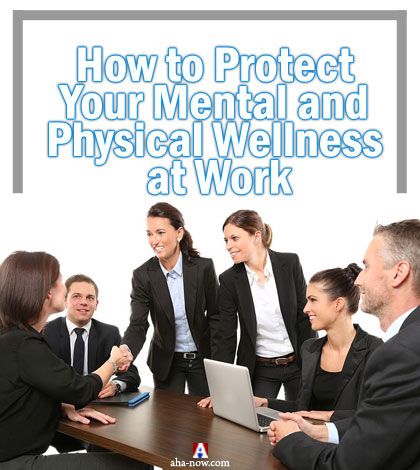How to Protect Your Mental and Physical Wellness at Work

Your mental and physical health is crucial to all aspects of your life, including work. You need to make some efforts to maintain a healthy mind-body and work-life balance for a happy, productive, and successful life. Here are some tips to help you understand what you need to do to maintain and protect mental and physical wellness at work. ~ Ed.
Did you know that most people spend almost 25% of their adult lives at work?
Well, if you want to live a good life, you need to have a good work-life balance.
Protecting and enhancing your physical and mental well-being while working helps establish a healthy work-life balance.
If you maintain this balance, you’ll be productive at work without sacrificing other dimensions of your life.
However, your wellness at work is challenging. Stress, anxiety, deadlines, phone calls, texts and co-workers can all combine to make ‘wellness at work’ seem like an oxymoron.
It may seem impossible to strike that balance of wellness and work; there are several things you can do to promote a healthy mind/body lifestyle while at work.
There are excellent guides that help you maintain both your physical and mental health at work and provide you with advice for people who work in offices as well as those who have manual labor jobs.
Maintain Physical Health
Your physical health impacts every aspect of your life. As such, focusing on maintaining good physical health is a natural starting point.
Working in an office setting, employees tend to remain sedentary for most of the day. That sedentary lifestyle brings with it an increased risk for obesity, heart disease and diabetes.
But don’t worry! You don’t need to work up a sweat in the office just to maintain good physical health. However, adopting a few alterations to a completely sedate office existence can have a profound effect on your physical well-being. Consider doing just a few of the following:
Take Regular Breaks
Studies have shown that just getting up and walking around your office is good for your circulation as well as both your mind and body.
If walking around the office is not allowed then walking meetings could be a good option too as this is a way to work (doing meetings) while you walk.
Take a Walk (or a longer walk) on Your Lunch Break
Instead of just (again) sitting in a cafeteria or a restaurant for your lunch, make an effort to use your lunch break for nourishment as well as a time for some physical exercise. It sharpens the mind and helps the body.
Furthermore, it also helps speed up digestion, which can help alleviate that drowsy feeling many people experience after lunch — especially if you have to attend a meeting at 1:00.
Eat healthy
Yep, eating properly is at the core of almost any physical fitness plan. Just as a house must be built upon a strong and solid foundation, your physical health is built upon proper nutrition. Pack (or order) a healthy lunch and snacks.
Just remember, these suggestions keep you active at work. Make sure you participate in at least 30 minutes of vigorous exercise at least three times a week.
Don’t Ignore Mental Health
You treat your body like a temple…treat your mind like a shrine! You can maintain your mental health at work the same way you keep your body fit. Here are some suggestions:
Minimize Distractions
Coworkers, texts, phone calls, emails and meetings get in the way of productivity. Some sources have suggested that it takes over 23 minutes for an employee to regain their concentration after a distraction.
For every thirty-second distraction (text, ‘important’ email, call, etc.), you’ve just lost a half hour of productivity.
Set aside time during the day where you are ‘unavailable’ to anyone/everyone. Use that time to boost productivity. You’ll get more done, lower stress, and improve the quality of your work. It’s a win for everyone.
Do Yoga/Meditation
Studies have shown that even a few minutes of quiet, reflective contemplation (including yoga — which has physical benefits as well) have enormous benefits on employee production.
Clearing your mind, even for a few minutes…works wonders. Companies are coming round to encouraging this sort of productivity boost.
Consider a Change in Your Hours
Companies that value the mental health of their employees recognize that not everyone works at their optimum level from 9–5. Some employees work well at night, and others are early birds and do their best thinking long before others are awake.
Employees that have long commutes find that working from home gives them time in the morning (or evening) that they can devote to other activities without compromising their work productivity.
Some employees can get up, exercise, see their children off to school and still log into their computers to be at work on time. Those employees improve their mental and physical health while maintaining a healthy work/family balance. It’s a win all the way around.
Manage Stress
Perhaps no one thing contributes more to unhealthy wellness at work than stress.
Stress manifests itself in so many different (and negative) ways that you might not even be aware of it. Stress can keep you from being at your mental best while at work and then invade your mind at night while you try to sleep, and your physical well-being suffers.
Here are some tips to help you manage your stress environment at work:
Avoid Workplace Drama
Everyone knows the one or two co-workers whose life is a constant whirlwind of self-inflicted drama. These are people who feel like they must share (overshare?) it with anyone/everyone they can.
Avoiding these people (and the time they waste) is one key to keeping your sanity at work.
While not all workplace divas can be avoided (particularly in small settings), recognizing them and avoiding them (if at all possible) is a critical step in managing your workplace stress levels.
Bite Off Only What You Can Chew
Hate presentations? Don’t accept the responsibility of giving one if you’d rather not.
If you MUST give one, try to minimize the number of your other tasks so you can focus on giving a good presentation.
Choose Assignments as Per Your Skillset
Yes, don’t accept assignments which aren’t good fit for your skillset.
While exiting one’s comfort zone can help us to grow—if you wander too far outside of your comfort zone volunteering for a project that’s not a fit for your skillset, you could find yourself a victim of self-inflicted stress (and a negative review).
Conclusion
Your mental and physical health at work helps you perform at your very best.
Employees should recognize that adopting some of these suggestions will benefit both the employee and the company.
Companies that encourage employees to maintain a healthy mind-body balance are rewarded with both healthy employees and a healthy bottom line.
Over to you –
How do you protect your mental and physical health at work? Share your tips and experiences in the comments.
Disclaimer: We're not offering any medical advice here. These ideas are for educational and entertainment purposes only. Always seek a professional medical opinion from a physician of your choosing before making any medical decision. The information provided here is not intended to be a substitute to the advice given by your physician or another healthcare professional.
Disclaimer: Though the views expressed are of the author’s own, this article has been checked for its authenticity of information and resource links provided for a better and deeper understanding of the subject matter. However, you're suggested to make your diligent research and consult subject experts to decide what is best for you. If you spot any factual errors, spelling, or grammatical mistakes in the article, please report at [email protected]. Thanks.











Greetings! Very useful advice in this particular article! It’s the little changes that make the largest changes. Thanks a lot for sharing!
Great Post. Really liked the idea.
I think prioritization of tasks is very important.
What do you think?
Jesse, Thanks for the great reminder. I know when I worked in the Emergency Room at my local hospital I didn’t pay attention to any of these tips….thankfully it was only several months and then the hospital downsized the nurses. But then I realized that with my next job, I had to go outside and breathe some fresh air. Take a quick walk. And just that simple act of getting away for a few minutes changed the last half of my shift. I could mentally get through the difficult issues because I had a chance to reset.
I will be sharing this post because it is a life-changer for those who implement it.
~ Johanna
Awesome Blog post,
A healthy workplace is one in which workers and managers collaborate to use a continual improvement process to protect and promote the health, safety and well-being of all workers and the sustainability of the workplace by considering the following, based on identified needs:
Health and safety concerns in the physical work environment;
Health, safety and well-being concerns in the psychosocial work environment, including organization of work and workplace culture;
Personal health resources in the workplace; and
Ways of participating in the community to improve the health of workers, their families and other members of the community.
I’ve been logging my time on tasks in my bullet journal. This way I’m able to track my peak productivity time and how long it takes me to get things done.
Then, I schedule a workout (2 miles a day). It’s this workout time that helps me recharge and reflect on my work. Some days I don’t want to go, but in the end, it’s always worth it.